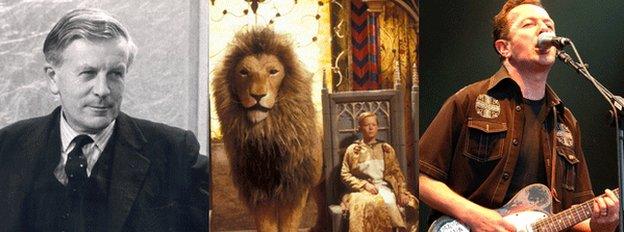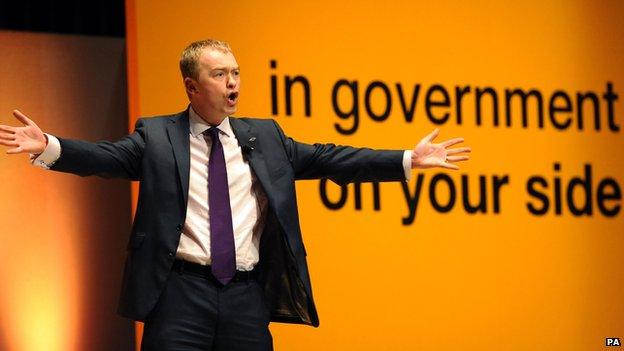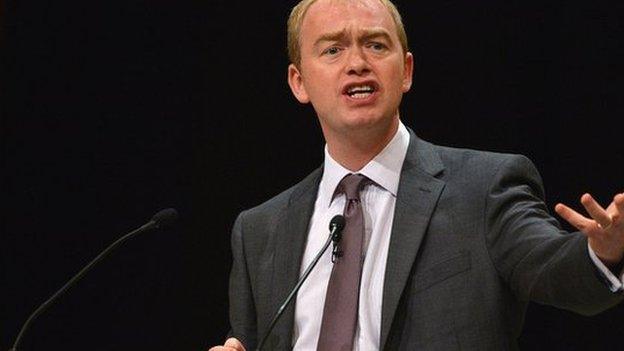Profile: New Lib Dem leader Tim Farron
- Published

Mr Farron's easy-going manner and attacks on the Conservatives made him a favourite of party members
Popular with Liberal Democrat activists for nearly a decade, Tim Farron has long been regarded as a potential future party leader, although his tilt at the top job may have come a little bit earlier than he expected.
Mr Farron, along with his leadership rival Norman Lamb, was one of only eight MPs left standing after May's election, which saw the party's dreams of remaining in government dashed and its presence in the Commons dramatically diminished.
In the wake of Nick Clegg's resignation, the 45-year old father of four and MP for Westmorland and Lonsdale was immediately installed as the bookies' favourite to succeed him.
The fact that he did not serve alongside the Conservatives in the coalition government and could present himself as a "clean skin" was always likely to appeal to members still trying to come to terms with one of the worst setbacks in the party's history.
Mr Farron maintains that he "did not make the cut" when Mr Clegg dished out ministerial positions in 2010. Instead, he became party president, positioning himself as a critical friend of the coalition and building up his power base within the party.
Although he endorsed the government's austerity measures, including controversial spending cuts and benefit restrictions, he frequently took aim at his coalition partners, describing them at one point as "toxic".

Who is Tim Farron?

The Newcastle University graduate joined the Liberal Party aged 16
He stood for Parliament four times before finally being elected in 2005
He has increased his majority from under 300 to more nearly 9,000 in the past 10 years
He voted against a rise in tuition fees in 2011
He did not serve in the coalition and was party president between 2011 and 2014
His heroes are Jo Grimond, Joe Strummer and CS Lewis

Crucially, he voted against plans to raise the cap on university tuition fees to £9,000 in January 2011, a U-turn which became a defining moment for the Lib Dems and one from which they struggled to recover.
Mr Farron is popular with activists for his tub-thumping party conference speeches and easy-going manner, but he has not always been regarded with similar affection by party elders.
After suggesting the Lib Dems deserved only two out of 10 for its performance in government, he was rebuked by, among others, former leader Lord Ashdown, while former deputy leader Vince Cable very publicly questioned his judgement.
Mr Farron always insisted he had been referring to the party's handling of coalition relations and the wider politics involved rather than its achievements in power but it was taken by some as evidence of disloyalty and future ambition.

Tim Farron positioned himself as a critical friend of the coalition but some thought he was too critical
After joining the Liberal Party at the age of 16, Mr Farron - who was born and educated in Lancashire - was active in student politics at Newcastle University, becoming the first Lib Dem to head the university's Union Society.
After graduating with a politics degree in 1992 - a year in which he also stood for Parliament - he worked in higher education for Lancaster University and St Martin's College in Ambleside for over a decade before entering Parliament in 2005 at the fourth attempt.
He has put his experience of grassroots, pavement politics - learnt from years serving on Lancashire County Council, South Ribble Borough Council and South Lakeland District Council - to good effect, building the parliamentary majority in his Cumbrian seat from less than 300 in 2005 to nearly 9,000 in the 2015 general election.
A keen Blackburn Rovers supporter, Mr Farron was a once a goalkeeper in a local team. His other passions include music.
In an interview with the BBC in 2008, he named his three heroes as former Clash singer Joe Strummer, former Liberal leader Jo Grimond and the novelist, academic, and theologian CS Lewis, best known as the author of the Chronicles of Narnia but also a prolific writer of meditations on Christianity.
Christian faith
During the two month leadership campaign, Mr Farron has spoken openly about his faith, telling the Guardian, external that he had sought advice from God before deciding whether to put his name forward.
He has insisted there is no dichotomy between his political and spiritual beliefs, a position he was forced to address after it emerged that some members of Mr Lamb's campaign had conducted private polling of party members about issues related to Mr Farron's faith.
Speaking on the BBC's Victoria Derbyshire show last month, he said the row went to the heart of the often unspoken issue of whether it is "compatible for anybody to lead a Liberal Party and be a Christian".
Mr Farron, who was baptised at 21 and rededicated himself to God at 30, accepts some in his party regard his faith as a weakness, wryly observing that "in the US, everyone has to invent a faith to get elected" but in the UK "you're not allowed to have one".
He has taken flak for abstaining in a Commons vote on same-sex marriage last year, although he supported the landmark bill legalising gay marriage at all its crucial stages, and for recently describing a woman's decision to terminate a pregnancy as a "tragedy", although again he has clearly supported the right to choose and the current abortion law as it stands.
Before winning the leadership election - with 56% of votes cast - Mr Farron vowed to reconnect the leadership with party members and champion stances that have become unfashionable elsewhere in Westminster, such as stressing the benefits of immigration and membership of the European Union.
The party may have a mountain to climb if it is ever to get back to power but Mr Farron has signalled that he will not be content with wallowing in opposition, saying that "if you want to change the world, then you have to come first".
- Published14 May 2015

- Published23 June 2015
